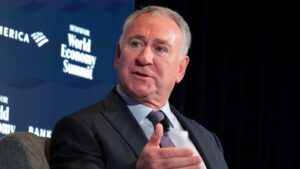The Tariff Dilemma: Insights from Ken Griffin on U.S. Economic Policy
In a recent conversation at the Semafor World Economy Summit 2025, billionaire hedge fund manager Ken Griffin shared his thoughts on the current state of U.S. economic policy and its implications for working-class Americans. As the founder and CEO of Citadel, one of the world’s largest alternative investment firms, Griffin offers a unique perspective on the interplay between tariffs, inflation, and economic growth.
Understanding the Tariff Impact
Griffin was vocal about his concerns regarding President Trump’s punitive tariffs on U.S. trading partners, which he argues disproportionately affect hardworking Americans. "Tariffs hit the pocketbook of hardworking Americans the hardest," he stated during his appearance on CNBC’s "Closing Bell." He described tariffs as a form of "sales tax," emphasizing their regressive nature. This commentary sheds light on a critical economic principle: while tariffs may be implemented with the intention of protecting domestic industries, the end result often includes increased prices for consumers.
Market Reactions and Economic Consequences
The recent surge in tariffs, particularly a staggering 145% on imported Chinese goods, has already created significant volatility in the stock market. In response, China retaliated with its own 125% levies, exacerbating the tension between the two economic giants. Griffin warns that this tit-for-tat escalation could lead to stagflation—a perilous combination of stagnant economic growth and rising inflation.
"As we see higher tariffs, we’re likely to face inflationary pressures that could hinder economic performance," Griffin noted. He emphasized that how the administration manages these policies will dictate the nation’s economic trajectory.
Political Ramifications and Voter Sentiment
Interestingly, Griffin’s support for Trump contrasts sharply with his criticism of the administration’s trade policy. He suggests that while many voters initially backed Trump due to discontent with previous economic policies, they could quickly shift their focus to inflation management, especially as midterm elections approach. "The president really does have to focus on managing inflation because it’s front and center in the minds of American voters," he pointed out, urging the administration to prioritize this issue.
A Look Ahead: The Three-Pronged Economic Program
Griffin outlined the components of Trump’s economic strategy as described by Treasury Secretary Scott Bessent: trade policy, tax cuts, and deregulation. The key question he raised is whether these elements can harmoniously converge to deliver the growth the economy desperately needs.
"Will all three of those come together to give us the growth that we need in our economy?" Griffin asked, a vital query for anyone interested in the future of U.S. economic health.
Conclusion: What It Means for Investors
For investors, the current political and economic climate serves as a crucial backdrop for future market strategies. At Extreme Investor Network, we believe it is essential to stay informed about these developments, analyzing their potential impacts on market conditions and investment opportunities.
Understanding the dynamics of tariffs, inflation, and economic policy equips us to make better investment decisions. In this unpredictable landscape, knowledge is power, and at Extreme Investor Network, we strive to empower our readers with the insights they need to navigate the challenges and opportunities ahead.
Stay tuned to our blog for more expert insights and updates on how global economic policies affect your investment strategy. Your financial future deserves the best information available, and we’re here to provide it.

